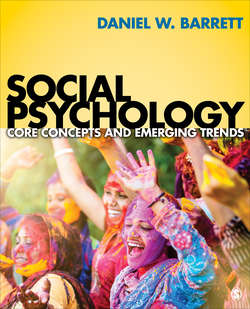Читать книгу Social Psychology - Daniel W. Barrett - Страница 141
На сайте Литреса книга снята с продажи.
Social Psychology Applied To Health Stress And Coping
ОглавлениеYou don’t need me to tell you that college can be very stressful, especially if you live away from home for the first time and are juggling work and/or time with a partner and other friends. What are your biggest stressors? Some of the stressors most common among college students relate to time management in a less structured setting, navigating social relationships, isolation/separation from family and friends, and use of drugs and/or alcohol (Baghurst & Kelley, 2014; O’Hara, Armeli, Boynton, & Tennen, 2014; Stoliker & Lafreniere, 2015). Why, do you suppose, do those events or situations cause you to feel stress? Well, some obviously involve change, and changes—even those we embrace enthusiastically—can lead to stress. Clearly, people vary in what we find stressful. Psychologists argue that stress has more to do with how we subjectively construe and respond to life situations than with the “objective” events themselves (Lazarus, 2012; Lazarus & Folkman, 1984).
According to the appraisal model of stress, we engage in two appraisal processes regarding a potential stressor that impact how we emotionally respond to it (see Figure 3.5) (Folkman & Lazarus, 1988; Folkman, Lazarus, Gruen, & DeLongis, 1986; Lazarus, 2006). The primary appraisal process involves interpreting the event or situation as a negative threat, a positive opportunity, or simply irrelevant to us. The secondary appraisal process is an assessment of what the person can do to respond to the event or situation in order to minimize or avoid the harm or maximize the benefit. For instance, how are you likely to think about an upcoming social psychology exam? Do you see it as an opportunity to demonstrate what you have learned or as a threat to your self-esteem and/or grade? After this primary appraisal, you would secondarily consider whether you have the ability to adequately handle this exam. These appraisals will partially determine whether you look forward to or dread the exam.
There is one more crucial stage in the Lazarus and Folkman’s (1984) model: coping. Once you have evaluated the upcoming exam as, say, a threat, you then need to decide what to do about it.
Emotion-focused coping seeks to manage the emotions associated with the event or situation. For instance, a person may deal with the anxiety by using alcohol or drugs. However, this is a short-term, ill-advised strategy because it fails to deal with the underlying cause of the stress. Instead, problem-focused coping leads a person to develop solutions that are not mere window dressing. For instance, after construing an exam as a threat, you could create a study guide, alter plans to allow for adequate study time, find a tutor, and so forth. Focusing on solving the problem can help deal with its emotional aspects as well as (we hope) appropriately handling the problem. Research has shown that problem-focused coping can lead to better outcomes in many domains of life (Baghurst & Kelley, 2014; J. Strack & Esteves, 2015; Wemm et al., 2013). I encourage you to reflect on your own methods of dealing with stress and whether they are working for you.
Figure 3.5 Appraisal Model of Stress
Source: Adapted from Folkman, S., & Lazarus, R. S. (1988). Coping as a mediator of emotion. Journal of Personality and Social Psychology, 54, 466–475.
Appraisal Model of Stress: States that people engage in two appraisal processes—primary and secondary—of a potential stressor that impact how they emotionally respond to it
